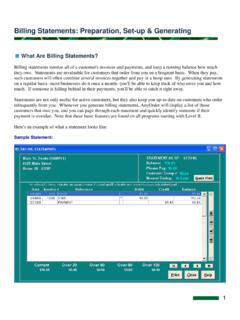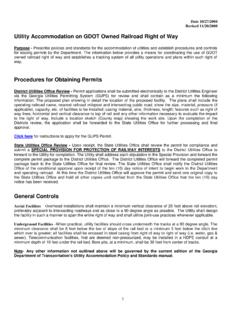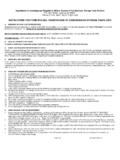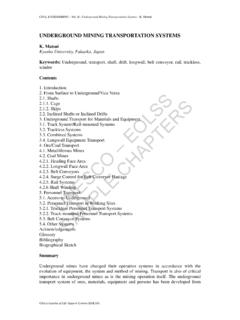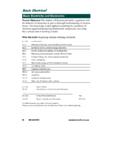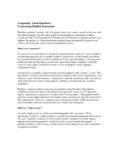Transcription of Walden By Henry David Thoreau - Great Rift Company Home …
1 Walden By Henry David Thoreau Time Period: 1845-1847 (The first edition of Walden was published in 1862 by Ticknor & Fields) Background Material* Henry David Thoreau (1817-1862) was born in Concord, Massachusetts not far outside Boston. His father owned a pencil manufacturing business, and although the family was not rich, the young Thoreau lived a comfortable life. Money saved from his father's business also enabled Thoreau to attend Harvard where he was a voracious reader and was attracted to the philosophy of transcendentalism. Transcendentalism was much on the mind of the literary set in the early and mid 1800's in America. The transcendentalist movement began in the US as the result of a religious controversy with the Unitarian church. Some ministers felt that the church had become too rational and the pathway to God that was taught depended far too much on following rules, rather than a deeply felt religious experience.
2 Some individuals like Ralph Waldo Emerson even left the ministry over the controversy. Emerson who became one of the most important advocates of transcendentalism, writing and lecturing extensively. Emerson said that men could transcend their ordinary existence and achieve deep spiritual fulfillment in their lives through a careful development of their consciousness and intellect. Thoreau was very much caught up in transcendentalism philosophy, and as we'll see, it forms the foundation and supporting latticework of Walden . During Thoreau 's life, tremendous changes were taking place in America. As a child, he lived a simple existence. Concord was largely agrarian, and the effects of the industrial revolution had not yet spread there. Townspeople walked or got around by horse-power. There were no clanging factories or screeching train whistles to mar the peacefulness of the countryside.
3 As he grew older, however, a track was laid between Concord and Boston and the Fitchberg railroad came into being. With the coming of the train, life began to change very rapidly. The changes particularly effected farming. Prior to the coming of the railroad, farmers grew produce mainly for the purpose of sustaining their families. What was left over was sold in nearby markets, but the train made it possible for farmers to raise one or two cash crops that could be sold to markets hundreds of miles away. There was also money to be made in firewood. Those who owned woodlots could cut down trees and ship the wood to Boston to keep the stoves and furnaces of the city burning throughout the winter. Ice cut from the lakes around Concord, including Walden , could be shipped elsewhere for use in refrigeration.
4 The slow, old ways were a thing of the past. With trains, people moved quicker from place to place, and the overall pace of life was speeding up. Thoreau was concerned about all of these changes, and he used Walden to ask whether all these changes were really good for the soul. Thoreau also was affected by what industrialism was doing to the fabric of American life through the exploitation of workers. The new factories needed cheap labor, and people worked long hours in horrible conditions for a small amount of pay. Exploitation of people was never more pronounced than in the practice of slavery in the South. Thoreau abhorred slavery, spoke and wrote against it. His family's home even served as a stop-over for the underground railroad for run-away slaves seeking freedom. After graduating from Harvard, Thoreau tinkered with different jobs.
5 He tried teaching, working in his father's pencil factory, and surveying. It was writing, of course, that he really wanted to do, but there wasn't any money in that. His friends and acquaintances in Concord couldn't understand why Thoreau , a graduate of Harvard, was not making something of himself. From his educational background, he could have gone into several fields including law, ministry, business or teaching, but none of those professions were really suited to his temperment. In 1839, he and his brother went on a boat trip on the Concord and Merrimack Rivers to Mt. Washington in New Hampshire. He recorded his impressions in a journal, and ten years later after re-working the material, it became his first book, A Week on the Concord and Merrimack Rivers. After the boat journey, Thoreau lived for a while at Emerson's house, and a warm relationship developed between the two.
6 Emerson encouraged him in his writing and even asked Thoreau to edit one of the issues of Dial, a transcendental journal. In 1845, Emerson allowed Thoreau to use a piece of property that he owned along Walden Pond near Concord. There Thoreau built a small cabin, and in his quiet hideaway, he planned to finish work on the Concord and Merrimack rivers book. But he had something else in mind, an experiment of sorts. By this time after living with Emerson, he was thoroughly steeped in transcendentalism, and he wanted to see if he could work one day and spend remaining six other days reading, contemplating and developing his consciousness. In 1846, Thoreau began working on a lecture which he would use to explain to the townspeople of Concord just what he was trying to accomplish by living in a small Spartan cabin along Walden Pond.
7 The lecture soon took on a life of its own and after much writing and re-writing, the lecture gradually evolved into his most famous work Walden . For all its impact in the literary and outdoor worlds, Walden is not an easy book to read. Thoreau used many puns and clever turns of words and phrases in his writing. Since he intended part of it as a lecture, his playfulness with words and shifts of emphasis helped liven things up and get a laugh from his audience, but his irony can be missed by modern readers. Thoreau , after all, was writing for a Nineteenth century audience not a Twenty-first century audience. Moreover, Thoreau also utilized numerous literary illusions that can leave a good many readers scratching their heads. Thus, to help in understanding passages in Walden --and make the reading of Thoreau a bit easier--short descriptive annotations have been included in the text of the reading selections which follow.
8 One of the most important pieces of information helpful in understanding Walden is the book's connection to transcendentalism. As we discussed previously, in transcendentalism, spiritual fulfillment isn't simply the process of learning about the bible and listening to sermons, but rather it's the process of using one's mind to create a consciousness of God. Transcendentalists believe that the mind is a powerful instrument which is capable of imagination and intuition. Emerson believed that if people use their intellect and their intuition, they have the ability to become god-like. It's heady stuff and you can see an eager Thoreau re-stating it in Walden : "I know of no more encouraging fact," he wrote, "than the unquestionable ability of man to elevate his life by a conscious endeavor.
9 " And, take a look at this famous quote from Walden found in the conclusion: I learned this, at least, by my experiment: that if one advances confidently in the direction of his dreams, and endeavors to live the life which he has imagined, he will meet with a success unexpected in common hours. He will put some things behind, will pass an invisible boundary; new, universal, and more liberal laws will begin to establish themselves around and within him; or the old laws be expanded, and interpreted in his favor in a more liberal sense, and he will live with the license of a higher order of beings. In proportion as he simplifies his life, the laws of the universe will appear less complex, and solitude will not be solitude, nor poverty poverty, nor weakness weakness. If you have built castles in the air, your work need not be lost; that is where they should be.
10 Now put the foundations under them. That's transcendentalism, pure and simple. Thoreau did a Great service for transcendentalists, although to his disappointment, his contribution went unrecognized in his day. Philosophers such as Emerson (who were recognized in their day) exposed the theory of transcendentalism, but Thoreau came along with something more useful: through Walden he provided a concrete way to live it. Let's look at this just a bit closer. In his writing, Emerson described three basic stages of a transcendentalist life: 1) The transcendentalist learns all that is of merit in the wisdom of the past. This comes largely through reading. 2) The transcendentalist lives a harmonious relationship with nature, and by doing so is able to discover ethical truths and communicate with the divine.
